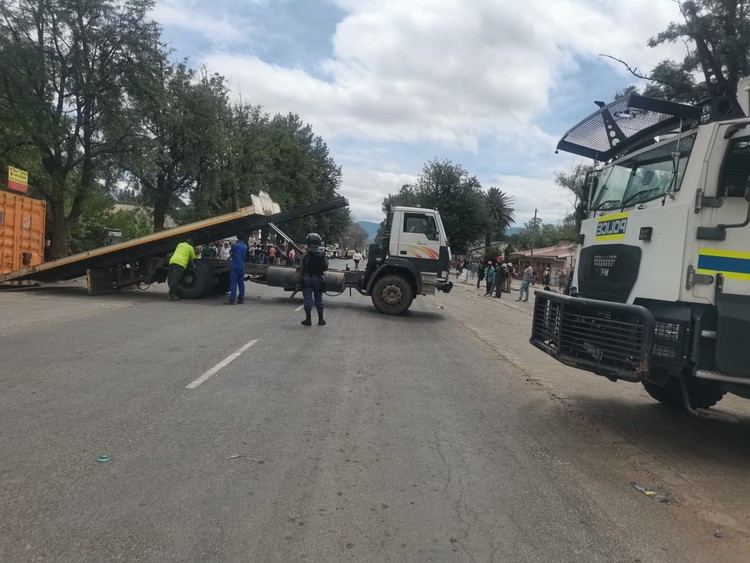Eastern Cape traders shut down by municipality over festive season
More than 40 stalls and containers were demolished and removed from main road in Cacadu
Informal traders in Cacadu in the Eastern Cape are struggling to make ends meet since their stalls were demolished by the Emalahleni Local Municipality. Photo supplied by Asanda Dlikilili.
- More than 40 stalls and containers belonging to informal traders have been demolished and removed from the busy Indwe Road in Cacadu, formerly known as Lady Frere in the Eastern Cape.
- The Emalahleni Local Municipality says the move is part of its plan to clean up the town’s business district.
- But the traders say they are struggling and are unable to earn an income since their stalls were demolished.
Informal traders in Cacadu, formerly known as Lady Frere, say they are struggling to make ends meet after their stalls were demolished by the Emalahleni Local Municipality.
According to the traders, the municipality has demolished almost 40 stalls since 14 December, leaving most of them without a means to make money during the festive season. The most recent stall demolition occurred on Sunday, 7 January.
The traders staged a protest by burning tyres along Indwe Road near the municipal offices on 6 January, pleading for the municipality to allow them to erect their stalls again.
Trader Nomzi Gqirhana told GroundUp they received court papers signed by the Grahamstown High Court on 10 December, ordering them to remove their stalls within seven days or they would be demolished.
The court order was issued on 22 August 2023 but the sheriff only delivered it to the traders in December.
Gqirhana said soon after getting the notices, they all marched to the mayor’s office for answers, but were snubbed.
She said not long after their march, they saw trucks and police coming to demolish their stalls.
“It was chaotic. We were crying, begging them to stop but they didn’t care. We staged a protest hoping that they were going to stop but the police were so cruel. We watched as they were leaving with our containers. We felt helpless, not knowing what to do or say.”
Gqirhana said she had been selling cosmetics from her shipping container for more than 20 years. She shared the space with another trader who paid her about R6,000 rent per month. She said she used that money to raise her three grandchildren and support her daughter at university.
She said her husband gets a R2,000 pension but it’s not enough to support their family’s monthly needs.
“What makes us so sad is that our municipality decided to destroy our businesses in December and January. Some of us had laybys which we could not afford to pay. Where are we going to get money to buy our children’s (school) uniform and stationery?” asked Gqirhana.
“I don’t see myself voting ever again. Why should I vote for people who do not care for us? Most hawkers here are single mothers who rely on a child support grant. We didn’t have a problem about being removed but they should have given us an alternative space,” she said.
Another trader, Sizakele Mahlaba, worked at a food container and relied on the R750 she was paid weekly. She said she supports her mother, young brother and her four-year-old child.
“I was forced to borrow R300 from the loan shark to pay out for the laybys. We are now in January and I don’t know where I’m going to get another job. It’s frustrating staying at home doing nothing while the kids are crying of hunger,” said Mahlaba.
Community activist and former Cacadu business forum chairperson, Asanda Dlikilili, said it was devastating watching the traders “crying while their belongings were destroyed”.
Dlikilili said she empathised with the traders who had lost their material and hard work. “This municipality has a very high rate of unemployment, that is why we have so many hawkers. People are not against the development and we just want to have a clean town,” she said.
Emalahleni Local Municipality spokesperson Luthando Nqumkana said the removal and demolitions were part of the City’s plan to clean up the town centre. He said many of the stalls were informal and were made of zinc and wood.
Nqumkana said the congested environment made it difficult for law enforcement officers. He said the municipality had asked the traders to relocate to Zulu Square but they did not.
“We opened engagements but the owners of informal structures and containers built illegally along Indwe road and other internal streets in town and were not willing to relocate to Zulu Square. We were left with no option but to seek a legal route,” said Nqumkana.
He said the municipality has plans to make Zulu Square an informal trading hub. But the traders GroundUp spoke to said they were never told about Zulu Square and if that was the case, they wanted the municipality to help them move their stalls there.
Next: My children will go to school without shoes, says mother whose child grant has not been paid
Previous: PRASA settlement to double in size in spite of problems with water and sanitation
© 2024 GroundUp. This article is licensed under a Creative Commons Attribution-NoDerivatives 4.0 International License.
You may republish this article, so long as you credit the authors and GroundUp, and do not change the text. Please include a link back to the original article.
We put an invisible pixel in the article so that we can count traffic to republishers. All analytics tools are solely on our servers. We do not give our logs to any third party. Logs are deleted after two weeks. We do not use any IP address identifying information except to count regional traffic. We are solely interested in counting hits, not tracking users. If you republish, please do not delete the invisible pixel.



